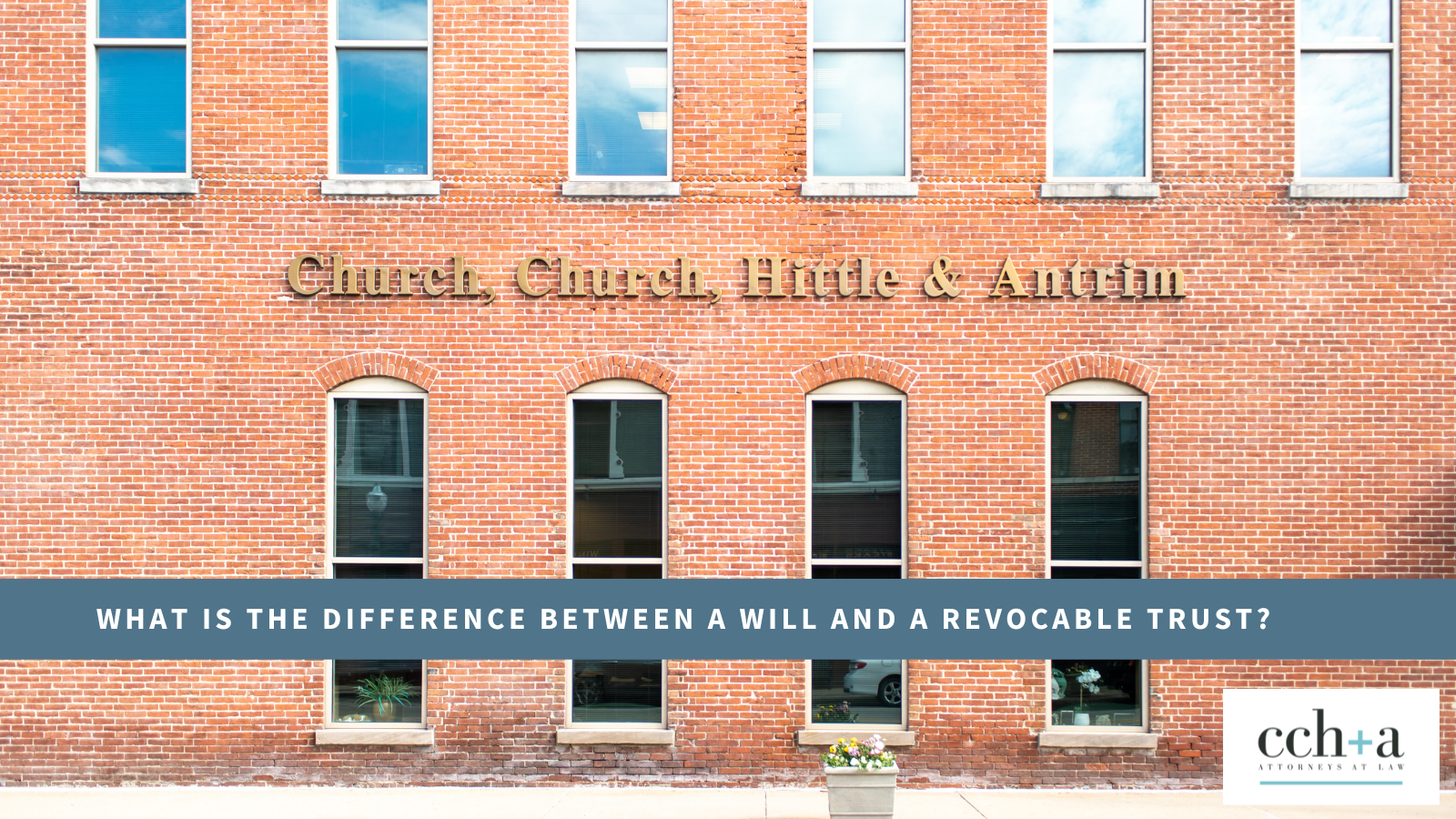What Is the Difference Between a Will and a Revocable Trust?

Author: Sarah J. Randall
POST DATE: 7.5.23

Putting together a comprehensive estate plan is among the most critical steps you can take to set your family up for a successful future. An effective estate plan can protect your assets from creditors and excessive taxes and allows you to distribute your property in the way that you choose.
Deciding between a will and a revocable trust is a critical step in the estate planning process. Each form of passing on assets has its advantages and disadvantages. Choosing the right one will depend upon the nuances of your estate. The skilled estate attorneys at Church Church Hittle and Antrim will work with you to create an estate plan and maximize the value of your estate for your heirs. Once your will or trust is set, we can be your partner in keeping it up to date as your life changes. Contact us today to schedule a consultation.
What Is a Will?
A will is an enforceable legal document that allows you to direct how you wish your property to be distributed after your death A will can also direct who will care for your minor children or pets. Perhaps most importantly, writing a will lets you avoid having your estate distributed based on Indiana’s default intestate succession laws.

Benefits of a Will
There are a few benefits of using a will over a trust. It is important to discuss all of these with an attorney to make sure you are finding the right fit based on your own unique estate and planning goals.
Cost Effective
A will is often cheaper to write and execute than a trust. Using a will to distribute your assets may also be more simple as you can also avoid the time and expenses associated with retitling assets and transferring ownership to the trust.
Court Oversight
Estates with over $100,000 in probated assets, usually must go through probate. While probate has disadvantages, there are benefits to having the court oversee the distribution of your estate.
Disadvantages of a Will
Though wills can be effective, they may also carry several disadvantages. Again, it is important to discuss all of these with an attorney to make sure you are finding the right fit based on your own unique estate and planning goals.
Must Go Through Probate
Court oversight, through probate, can be advantageous in some scenarios. However, it can also be time-consuming and costly. Depending on your planning goals, using a trust to avoid probate, could save on expense, time, and complexity for your heirs.

Trust vs. Will
The main difference between a will and a trust involves the ownership of your assets. With a will, you maintain ownership and control over your assets until you pass on. The will simply governs how your probate assets are distributed to heirs.
On the other hand, to be effective, a trust must take ownership of your assets during your life, after you establish the trust, or automatically at death. As Trustee, you can continue to maintain control over the trust and its assets until your death or incapacity, at which point a successor trustee will take over and manage the assets for the benefit of you or your beneficiaries.
What Is a Revocable Trust?
Before discussing the differences between a revocable vs. irrevocable trust, it is important to understand the basics of a revocable trust.
A revocable trust, or living trust, is a trust that the settlor (the person who created the trust) can amend or revoke at any time during their lifetime. Typically, the settlor is both the trustee and the beneficiary. Once the settlor dies, the named successor trustee manages and administers the trust for the benefit of the successor beneficiary.
On the other hand, an irrevocable trust cannot be amended after the settlor signs the trust document. A court may allow modifications to an irrevocable trust under limited circumstances.
Benefits of a Revocable Trust
As with any trust, the right one for you depends on your assets, family dynamics, and goals. Here are some advantages of a revocable trust.
Avoids Probate
When the trust settlor dies, the assets held in the revocable trust pass to the beneficiaries directly without the need to go through the probate process. There is typically no court involvement, which saves the beneficiaries time, money, and hassle. This type of administration often gives the beneficiaries access to their inheritance faster than if the assets had to go through probate and offers more privacy to the beneficiaries.
Gives You Flexibility and Control
The typical setup of a revocable trust is the settlor names themself as the trustee and the beneficiary while specifying a successor trustee and successor beneficiaries. As the settlor, you have complete control over how the trust operates and what assets it owns as long as you are alive and competent. Depending on your circumstances, you can modify the trust and cancel it entirely.
This is advantageous, especially as situations change for the successor beneficiaries. For example, if your child is a beneficiary, you can adjust the trust terms, conditions, and requirements if you become concerned about their spending habits.
Privacy
Unlike a will, which becomes public record when you die, a revocable trust is a private document. For those who want to keep their assets confidential, a revocable trust offers that kind of privacy.
Continuous Trust Management in the Event of Incapacity
If you become incapacitated because of an illness, accident, or injury, your successor trustee steps in to administer the trust. This can provide continuity and prevents disruption of the trust’s purpose.

Disadvantages of Revocable Living Trusts
The flexibility to revoke a trust may seem reason enough to include a revocable trust in your estate plan. However, these trusts come with some drawbacks.
Requires Administrative Work
Once you sign a revocable trust document, you should fund the trust. This means you need to be thoughtful about whether to retitle assets in the trust’s name, which may require a substantial amount of paperwork. You will also want to consider whether to direct assets to the trust at your death with a change of beneficiary forms.
More Costly
Revocable trusts may cost more to draft since they are sophisticated estate planning documents. However, the upfront cost of creating a trust will likely be less than the probate expenses your estate may otherwise owe after your death.
What Happens When a Loved One Dies Without a Will or Trust?
While having an estate plan is desirable, sometimes, our loved ones die without a will or trust. When this happens, their assets will be distributed via a process called intestate succession. To better understand the process, you should know who administers the estate, what will and will not pass through intestate succession, and who will receive what portion of the estate.
Who Administers the Estate?
Without a will or trust, the court may appoint an administrator to ensure the probate process goes smoothly. The order of assigned administrators can be found in Title 29, Article 1, Chapter 10 of the Indiana Code. Generally, if there is no will, the court will appoint the surviving spouse, an heir, or persons nominated by the surviving spouse or heir. The appointed administrator must not be younger than 18 years old, incapacitated, a convicted felon, or found unsuitable by the court for any other reason.

What Will and Will Not Pass Through Intestate Succession?
Only assets that would have passed through an individual’s will can be passed through intestate succession. This includes assets belonging to the decedent that do not have a beneficiary designation or a joint owner. Among items not included are assets that are co-owned, assets in a trust, or proceeds from life insurance with a designated beneficiary.
Who Gets What?
When a loved one dies intestate, their assets will be distributed based on a uniform system found inTitle 29, Article 2, Chapter 2 of the Indiana Code.
Contact the Estate Planning Group at CCHA
To discuss whether a will or a trust is right for your estate plan, contact our estate planning experts. We’ll work together to create a comprehensive estate plan that meets your needs. The attorneys at CCHA have over 140 years of experience providing legal services. For help with your estate plan, call usor reach out to us online. We look forward to finding out how we can help you.